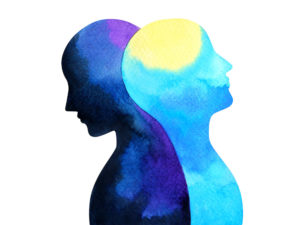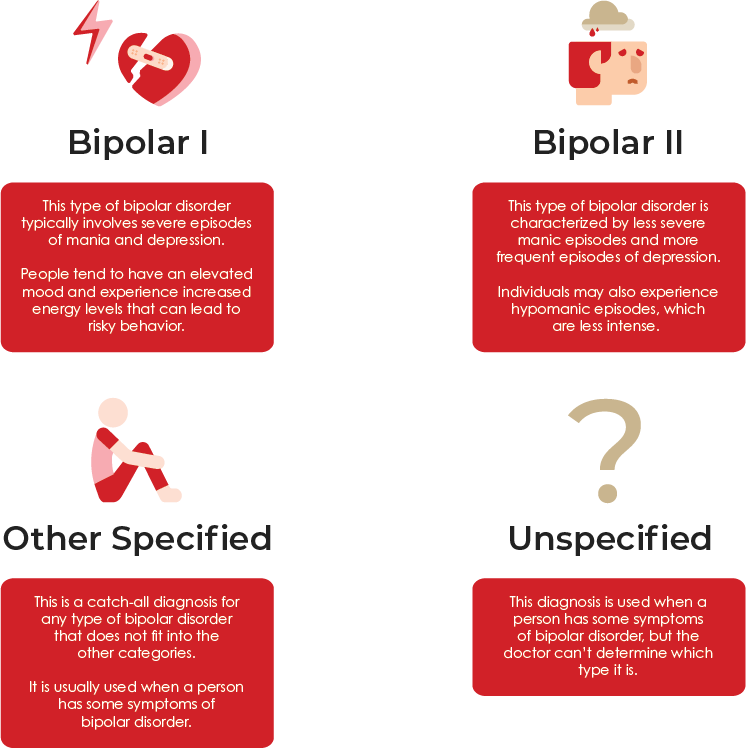How a Person With Bipolar Thinks
For anybody who doesn’t suffer from a mental health disorder, it can be difficult to relate to someone who does. Nobody knows how this works as much as those suffering; this is especially true as it relates to bipolar disorder. However, this doesn’t mean we can’t at least know how it works on a psychological level.
Table of Contents
ToggleWhat Goes on in the Mind of a Person With Bipolar Disorder?
People with bipolar disorder experience extreme highs and lows, which can lead to a rollercoaster of emotions. During manic episodes, they may feel invincible and full of energy. Their moods may swing between elation and intense depression on the same day, making it hard to make decisions or cope with daily life. They may also have racing thoughts and become easily distracted, leading to impulsive behaviors and poor judgment. During periods of depression, they may have trouble concentrating, lack motivation, and feel hopeless or overwhelmed by sadness.
What is Bipolar Disorder?
 Bipolar disorder, also known as manic-depressive illness, is a brain disorder that causes unusual shifts in mood, energy, activity levels and the ability to carry out day-to-day tasks. Symptoms of bipolar disorder are typically divided into two categories: mania and depression. Mania is characterized by an elevated or irritable mood, increased energy, a decreased need for sleep and an increase in goal-directed activity.
Bipolar disorder, also known as manic-depressive illness, is a brain disorder that causes unusual shifts in mood, energy, activity levels and the ability to carry out day-to-day tasks. Symptoms of bipolar disorder are typically divided into two categories: mania and depression. Mania is characterized by an elevated or irritable mood, increased energy, a decreased need for sleep and an increase in goal-directed activity.
Depression is characterized by a low mood, loss of interest or pleasure in activities, fatigue, decreased energy and difficulty concentrating. Bipolar disorder can lead to impaired functioning at work, school or home due to its disruptive effects on mood and behavior. Treatment usually involves medication and psychotherapy, which can help manage symptoms and prevent episodes of mania or depression. With the right treatment plan, people with bipolar disorder can lead productive and fulfilling lives.
If you or someone close to you is dealing with BPD, our bipolar disorder treatment center in Indiana can help. Feel free to reach out to us at any time if you have questions.
What are the Different Types of Bipolar Disorder?
Bipolar disorder is classified into four different types, each with its own distinct set of characteristics and symptoms. These different types include the following:

Bipolar I Disorder
This type of bipolar disorder typically involves severe episodes of mania and depression. During manic episodes, individuals often have an elevated mood and experience increased energy levels that can lead to risky behavior such as spending large amounts of money or engaging in risky sexual activities. During depressive episodes, individuals often feel very low and experience a loss of energy and motivation.
Bipolar II Disorder
This type of bipolar disorder is characterized by less severe manic episodes and more frequent episodes of depression. Individuals may also experience what are known as hypomanic episodes, which are similar to manic episodes but less intense. Individuals with bipolar II disorder may also experience rapid cycling between mood states, meaning they can cycle quickly from periods of mania or hypomania to depression and back again.
Cyclothymic Disorder
This is a milder form of bipolar disorder that involves more frequent shifts in mood. Individuals with cyclothymic disorder tend to experience alternating periods of hypomania and mild depression, known as dysthymia. This type of bipolar disorder can be difficult to diagnose because the symptoms may not last long enough for a proper diagnosis to be made.
Other Specified Bipolar and Related Disorders
This is a catch-all diagnosis for any type of bipolar disorder that does not fit into the other categories. It is usually used when a person has some symptoms of bipolar disorder, but they do not meet all the criteria for one of the more specific diagnoses. This can include conditions such as subthreshold manic episodes, subthreshold hypomanic episodes, cyclothymic disorder, and bipolar disorder due to another medical condition.
Unspecified Bipolar and Related Disorders
This diagnosis is used when a person has some symptoms of bipolar disorder, but the doctor can’t determine which type it is or if the severity of the symptoms meets criteria for any specific diagnosis. People with this diagnosis may still experience changes in mood, energy levels, and behavior.
How Many People Suffer from Bipolar Disorder in the United States?
 Bipolar disorder is a mental illness that affects millions of people worldwide. It is characterized by extreme mood swings and changes in energy, which can range from periods of extreme elation to episodes of deep depression. Symptoms associated with bipolar disorder may also include difficulty concentrating, sleeping too much or too little, feelings of worthlessness and suicidal thoughts.
Bipolar disorder is a mental illness that affects millions of people worldwide. It is characterized by extreme mood swings and changes in energy, which can range from periods of extreme elation to episodes of deep depression. Symptoms associated with bipolar disorder may also include difficulty concentrating, sleeping too much or too little, feelings of worthlessness and suicidal thoughts.
Bipolar disorder is a serious condition and can lead to severe impairment in someone’s ability to function normally. Treatment may include psychotherapy, medication, or lifestyle changes, such as getting regular exercise and avoiding caffeine and alcohol. With the right treatment plan, many people with bipolar disorder can lead normal, productive lives. It is estimated that around 2.6 % of adults in the United States have bipolar disorder.
What is Diagnosed Bipolar Disorder?
Bipolar disorder, also known as manic-depressive disorder, is a type of mental illness that causes extreme shifts in moods, energy levels, and activity. People with bipolar disorder experience episodes of mania and depression that can last for days or weeks at a time. During manic episodes, people may feel unusually energized and elated, while during depressive episodes, they may feel hopeless and sad. Bipolar disorder can affect a person’s relationships, work life, and day-to-day activities.
How Many People Aren’t Diagnosed With Bipolar Disorder in the United States?
It is estimated that up to 50% of people with bipolar disorder remain undiagnosed or misdiagnosed and do not receive appropriate treatment. This means that the true number of people with bipolar disorder may be much higher than current estimates suggest.
Those who are undiagnosed often suffer for years without proper treatment, and their symptoms can get worse over time. Without proper diagnosis and treatment, people with bipolar disorder can struggle with severe mood swings, impulsive behavior, difficulty functioning in daily life, anxiety disorders, and depression.
What is Undiagnosed Bipolar Disorder?
Undiagnosed bipolar disorder is a type of mental illness in which people experience extreme shifts in mood, energy, and behavior. People who have undiagnosed bipolar disorder often don’t recognize their symptoms as signs of mental illness and don’t seek treatment. As a result, their condition can become more complex and difficult to manage over time.
Common symptoms of undiagnosed bipolar disorder include: rapid speech, insomnia, racing thoughts or ideas, grandiose behavior, impulsivity, distractibility, poor decision making, increased energy, increased appetite, exaggerated optimism, suicidal thoughts or behavior. If left untreated, these symptoms can worsen and cause serious physical and psychological health problems.
How Does a Person With Bipolar Disorder Think?
People with bipolar disorder can experience dramatic shifts in their mood, energy levels, and behavior. These changes are known as manic or hypomanic episodes and depressive episodes. During manic or hypomanic episodes, a person might feel extremely energized and have racing thoughts that move quickly from one idea to the next.
They may also think they can do anything and be more likely to engage in risky behaviors. During depressive episodes, a person may feel low energy, experience feelings of worthlessness or guilt, and have difficulty concentrating. They can also struggle with suicidal thoughts or ideation. It is important to note that everyone’s experience with bipolar disorder is unique and individualized; therefore, the types of symptoms and intensity of episodes can vary greatly from person to person.
How is Bipolar Disorder Managed?
Bipolar disorder is typically managed with a combination of medications, psychotherapy, and lifestyle changes. Medications for bipolar disorder include mood stabilizers such as lithium, anticonvulsants like valproic acid or lamotrigine, and antipsychotics which are used to treat manic episodes. Psychotherapy can help patients develop coping strategies for managing their symptoms and avoiding triggers. It can also help to address underlying issues that may have contributed to the development of bipolar disorder.
Lifestyle changes all play an important role in helping to manage bipolar disorder. Some of these include the following:
- Getting enough sleep
- Maintaining a healthy diet
- Exercising regularly
- Avoiding drugs or alcohol
- Developing routines
- Setting manageable goals
- Learning new skills
Support from family and friends is also important in managing bipolar disorder. Being able to talk openly about feelings, challenges, and successes with supportive people can help those living with the condition feel less isolated and better able to cope. Joining a support group or finding a therapist can also be beneficial.
What Treatment Options are Available for Bipolar Disorder?

Treatment for bipolar disorder can include medications, individual and family therapy, lifestyle changes, and holistic treatments. Medications such as mood stabilizers, antipsychotics, antidepressants, and antianxiety drugs are commonly prescribed to help manage symptoms of bipolar disorder. Individual therapy is an important part of treatment; it can help people with bipolar disorder do the following:
- Learn how to cope with their symptoms
- Identify triggers for manic and depressive episodes
- Develop problem-solving skills
Family therapy can also be helpful in teaching family members how to best support their loved one living with bipolar disorder, as well as recognizing and managing their own stressors associated with having a family member with the condition.
First City Recovery Center is Here to Help
If you are interested in getting help for bipolar disorder, First City Recovery Center is here for you. If you’d like to find out more, you can contact us here.

MD, Psychiatrist
Dr. Vahid Osman, MD is a psychiatry specialist in Indianapolis, IN.
Dr. Osman completed a residency at Austin State Hospital. He has over 32 years of experience in Psychiatry & Behavioral Health. He is board certified by the American Board of Psychiatry and Neurology.




